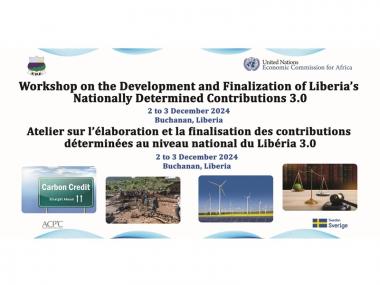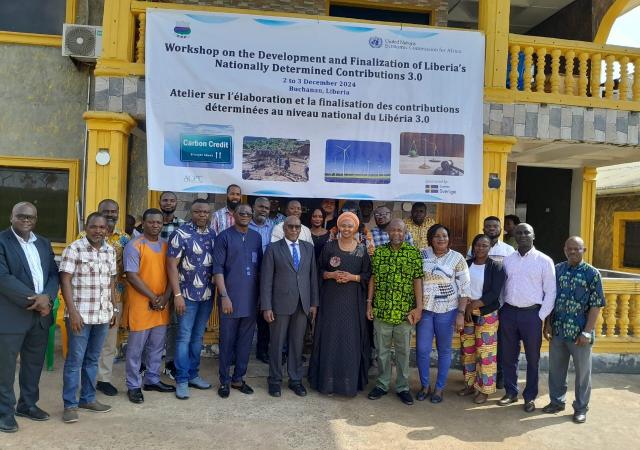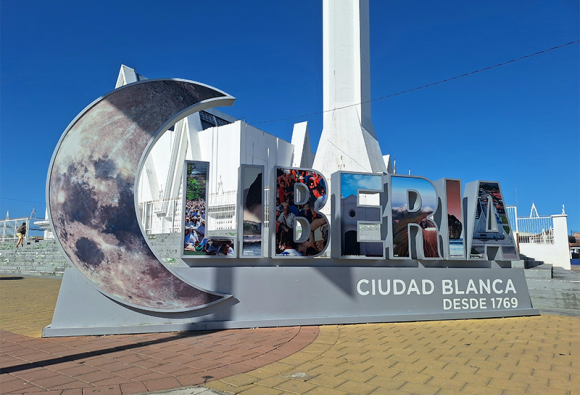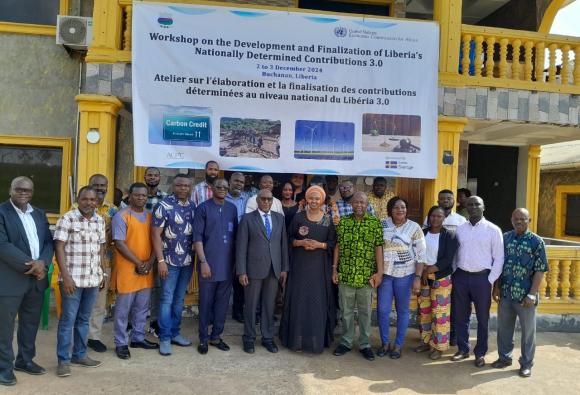
Summary
The African Climate Policy Center (ACPC) of UNECA is working with the Environment Protection Agency of Liberia to support the development and finalization of NDC 3.0. A workshop is being organized to consult a range of Liberian stakeholders on the strength and limitations of the current Nationally Determined Contributions and support Liberia in
developing NDC 3.0 which is progressive, ambitious and informed by the outcomes of first global stocktake.
Background
In the run-up to COP21, parties to the UNFCCC conceived Intended Nationally Determined Contributions (INDCs) as a means for countries to communicate the steps they will take to address climate change. INDCs reflected the level of ambition by each country in reducing emissions, considering its national circumstances and capabilities.
The Paris Agreement implementation framework calls for countries to submit new, revised and enhanced NDCs starting in 2020, and every five years thereafter. In addition, the Agreement requires parties to participate in a global stocktaking of progress in the reduction of global CO2 emissions every five years, which has started in 2023.
Since 2019, ACPC in collaboration with regional institutions, the NDC hub and the NDC partnerships, has embarked on a structured process for assisting member states in revising their NDCs. The ongoing support has been demand led and includes revision and updating of the existing NDCs. Although the specific areas of support vary from country to country, the cross-cutting thread has been consultations among stakeholder groups such as climate sensitive sectors (agriculture, energy, water, transport), policy makers, academics, youth and women, and alignment of NDCs with national development plans.
The African Climate Policy Center
The African Climate Policy Centre influences, strengthens and enables the transition to climate-resilient development in Africa through responsive policies, plans and programs towards transformed economies, healthy ecosystems and human well-being. The Centre serves as a knowledge hub and policy facilitation arm for poverty reduction through mitigation and adaptation to climate change in Africa.
The African Climate Policy Center vision is “to make Africa’s development sustainable, inclusive and climate-resilient”. Its mission is “to influence, strengthen and enable the transition to climate-resilient development in Africa through responsive policies, plans and programs towards transformed economies, healthy ecosystems and human wellbeing”.
Overall objective
The primary objective of the workshop is to engage stakeholders from climate-sensitive sectors and to identify key issues within the current Nationally Determined Contributions (NDC) based on the outcomes of the first stock take and to support the development of economy wide NDC 3.0 in alignment with national development plans.
Specific objectives
- Evaluate land use changes, agricultural practices, deforestation rates and carbon stock in forests and soils to set new targets in AFOLU sector in NDC 3.0.
- Assess the status of freshwater ecosystems (lakes, rivers, wetlands and aquifers) and gather baseline data on water quality, quantity, biodiversity and exiting pressure including pollution, over-extraction and climate impacts which help in setting freshwater targets.
- Consult with stakeholders, including government agencies, private sector entities, and civil society, to determine which sector can participate in market mechanism focusing on those with highest potential for emission reduction.
- Enhance the capacity of the national and sectoral focal persons in market mechanisms for integration in NDCs by providing training on various mechanisms such as carbon trading, offsets and credit systems with practical applications.
Expected Outputs:
- Data and information gathered for the AFOLU sector based on evaluations of land use changes, agricultural practices, deforestation rates, and carbon stock in forests and soils. To set new targets in NDC 3.0.
- Comprehensive baseline data collected on the status of freshwater ecosystems, including lakes, rivers, wetlands, and aquifers, covering water quality, quantity, biodiversity, and pressures like pollution and over-extraction, to inform freshwater target setting.
- Sectors with the highest potential for participation in market mechanisms for emission reduction identified.
- National and sectoral focal persons trained in various market mechanisms, including carbon trading, offsets, and credit systems, with a focus on practical applications for integration into NDCs.
Key Participants:
Representatives from the Environment Protection Agency of Liberia, Ministry of Agriculture, Ministry of Finance and Development Planning; Ministry of Gender and Development, Ministry of Lands, Mines and Energy, Ministry of Transport, Ministry of Public Works, the Private Sector, United Nations Development Program and other Development Partners will attend the workshop
Document
Development and Finalization of Nationally Determined Contribution (NDC) 3.0 of Liberia
Presentations
- Findings of the 1st GLOBAL STOCKTAKE and how to incorporate them into Liberia’s NDC
3.02.0 - Overview of Liberia’s Freshwater Ecosystems: A need for Safeguarding
- Current NDC 2.0 Gaps and Sectors to be Considered for Setting New Targets
- Mapping Existing Climate Actions Programs|Projects
- Existing National Projects and Initiatives Which Can Reduce Emissions including
- Emission Potential of Agriculture, Forestry and Other Land Use Practices
- Review of Liberia’s National Policies in Relations to Carbon and Emission Reduction
- Carbon markets – how it works ? (Recommendation for effective engagement)
- Appropriate Accounting Systems For NDC
- Liberia’s Experience in Setting Up Carbon Market Mechanism



